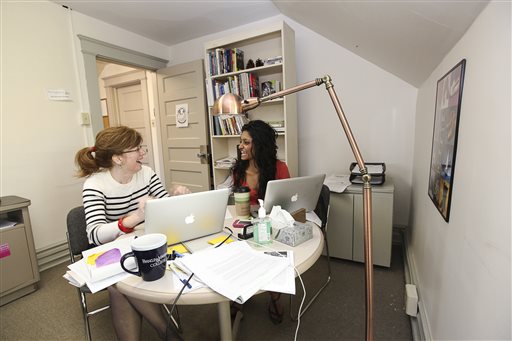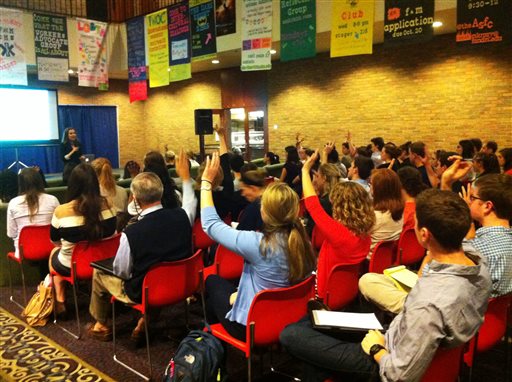NEW YORK — When Kitty Wo’s eldest daughter started at Scripps College in California in 2002, “we thought a liberal arts education would be a wonderful thing,” she said. “There was no pressure.”
Her two younger daughters graduated from Scripps in 2008 and 2012, and “with each successive child, we’ve thought more about their career path and what field of study would be best,” said Wo, who lives in Honolulu. “Each girl’s experience led the next one to being a lot more proactive,” with internships and other job-related experiences.
Wo’s middle daughter, an economics major, even worried that her younger sister’s media studies major wasn’t practical. “Her sister was thinking, “Oh my God, you’re watching movies?'” Wo recalled with a laugh.
All of Wo’s daughters landed jobs, but their shift in attitudes tells a bigger story. While some top-tier schools can still attract students by promising self-discovery and intellectual pursuits, many colleges have changed their emphasis in the years since the recession hit. Instead of “Follow your passion,” the mantra has become more like, “We’ll help you get a job.”
Schools have revamped career centers, expanded internship programs and pushed alumni to serve as mentors. The changes are not only in response to a tough job market, but because parents are demanding that graduates be prepared for the workplace.
“Parents and students’ questions and concerns have changed just as much as society has changed,” said John Fraire, vice president for student affairs and enrollment at Washington State University in Pullman, Wash. “Questions about job security, income, graduation rates — it’s to be expected.”
When Stephanie Albano worked as a student tour guide at Lehigh University in Bethlehem, Pa., she was equipped with a fact sheet on job placement rates, average salaries for graduates and other statistics. High school kids on the tours didn’t ask about jobs, said Albano, who’s now in law school, “but parents always did. It was the first question out there from parents. They want to make sure their kids are not going to end up moving back into their basements.”
Between 1966 and 2010, bachelor’s degrees in the humanities halved, from 14 percent of all degrees awarded to 7 percent, according to the American Academy of Arts & Sciences.
Sally Rubenstone, who writes CollegeConfidential.com’s “Ask the Dean” column, says “there is certainly concern, particularly at the liberal arts schools where they’re worried that they’re not going to be perceived as pragmatic in a competitive job market.”
But a few colleges have benefited from the shift in values. “Colleges like Northeastern and Drexel are really coming up in the world because they offer co-op programs,” where students spend several semesters in full-time jobs related to their studies, usually with pay, Rubenstone noted.
In the last six years, Northeastern University’s ranking on U.S. News & World Report’s college survey has soared from 98 to 56. And even though Northeastern’s tuition now tops $40,000 a year, applications have increased more than 40 percent since 2009, while SAT scores of incoming students have steadily risen.
Spokeswoman Renata Nyul says Northeastern’s co-op program is a “huge reason” for its popularity. “Our mission is to provide a real-world experience and an education that’s rooted in the integration of rigorous classroom learning and real-world professional experience,” she said. “That’s been the ethos of this place for a long time, but lately is seems to really resonate.”
Co-ops can also pave the way for permanent employment, Nyul says: “Ninety percent of our graduates are employed full-time and 87 percent are doing something related to what they majored in.”
While Northeastern’s co-op model is a century old, many other schools proudly point to career prep programs they’ve created since the recession began at the end of 2007.
—Franklin & Marshall College in Lancaster, Pa., “totally revamped” its career services this past year, according to Beth Throne, who heads the school’s new Office of Student and Post-Graduate Development, with life skills workshops on public speaking, social media, etiquette and even the art of the business meal; job-search boot camp for seniors and recent grads; and more on-campus recruiting. The school also created a database of alumni and willing parents in various fields, and students are aggressively matched to opportunities, resulting “in increased rates of employment.”
—At Washington College in Chestertown, Md., a “first-year career awareness” program opened for freshmen in 2009; a new externship program was launched this year; and a Wall Street program began in 2011 to connect students with alumni and others working in financial services.
—At Otterbein University, in Westerville, Ohio, “5 Cardinal Experiences” was launched three years ago to connect students with internships, research and other opportunities. This fall, a job shadow program will match students with local alumni.
—At Davidson College in Davidson, N.C., the Davidson Internship Challenge began three years ago, asking alumni to help students find and secure internships; it surpassed its goal of 100 internships in its first year by 17.
—McDaniel College in Westminster, Md., started its Center for Experience and Opportunity in 2012 to “help prepare students for life after college,” according to spokeswoman Cheryl Knauer, by helping them find internships, volunteering and service projects.
—York College of Pennsylvania in 2009 opened the Center for Professional Excellence, where, according to a video shown on tours, students can learn everything from social skills to public speaking.
Many colleges also now offer funding for unpaid internships so that students of limited means can afford to take them. And career-building is now a topic in freshmen seminars.
“Gone are the days when a second-semester senior can come into a career center for career assistance and expect to find a job immediately,” said Kathy Williams, director of Gettysburg College’s Center for Career Development in Gettsyburg, Pa., which encourages students to take externships and do job shadowing in freshman and sophomore year.
Even schools that train students for specialized industries are stepping up their game. Haemoon Oh, who joined the Hospitality and Tourism Management department at the University of Massachusetts-Amherst in 2008, used its alumni network to create a program in which students could meet industry leaders. When hotel CEOs in New York and Boston were reluctant to travel to the campus in western Massachusetts, Oh told them, “I’ll bring my students to you if you sponsor the trip.’ The concept was embraced by their corporate headquarters.”
But Oh’s goals were broader than just connecting students to potential employers. “If our kids can have an opportunity to interact with a chairman or CEO or industry icon in an informal setting, and ask whatever they want, that’s a worthwhile experience,” he said. “I wanted to inspire students and give them hope and ambition, especially in a time of recession.”
He also began a mentoring program, handpicking students to match with alumni in senior positions.
“I asked them to coach the students over the phone or by email, but many have taken it further,” he said, offering job shadowing and sometimes jobs. The number of employers taking part in the program’s career fair has more than doubled, and many seniors are getting multiple job offers.
Andrew Speno of Edmond, Okla., who’s looking at colleges with his teenage son, says the expanded emphasis on jobs is “a practicality. I was a political science major in college, my wife has a piano performance degree. We had absolutely no practical workplace skills when we graduated. And we struggled.”
He added: “Education for education’s sake is a luxury that middle-class families like us don’t have any more.”
But Louise Duncan of Brunswick, Maine, would have preferred less talk about careers on the college tours she took with her daughter.
“At some schools it was so flagrant and persistent that a few times I had to hold myself back from giving the poor little tour guides a drubbing,” she said. “I wanted to ask them to talk about the fascinating courses they took or the inspiring professors, or yell that I think the whole point of education is to learn interesting things.”
She added: “I get why they’re trying to sell it differently since liberal arts education has been attacked as poor value, but I don’t think that college for most kids is supposed to be vocational training.”
Copy the Story LinkSend questions/comments to the editors.




Success. Please wait for the page to reload. If the page does not reload within 5 seconds, please refresh the page.
Enter your email and password to access comments.
Hi, to comment on stories you must . This profile is in addition to your subscription and website login.
Already have a commenting profile? .
Invalid username/password.
Please check your email to confirm and complete your registration.
Only subscribers are eligible to post comments. Please subscribe or login first for digital access. Here’s why.
Use the form below to reset your password. When you've submitted your account email, we will send an email with a reset code.